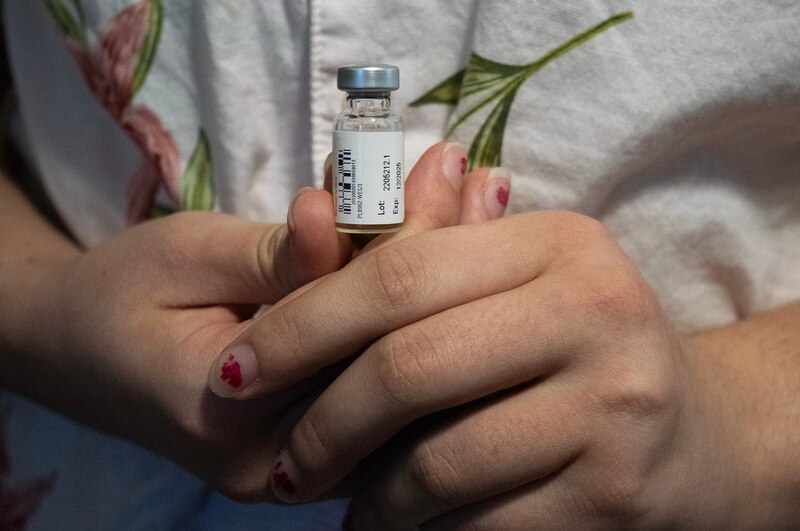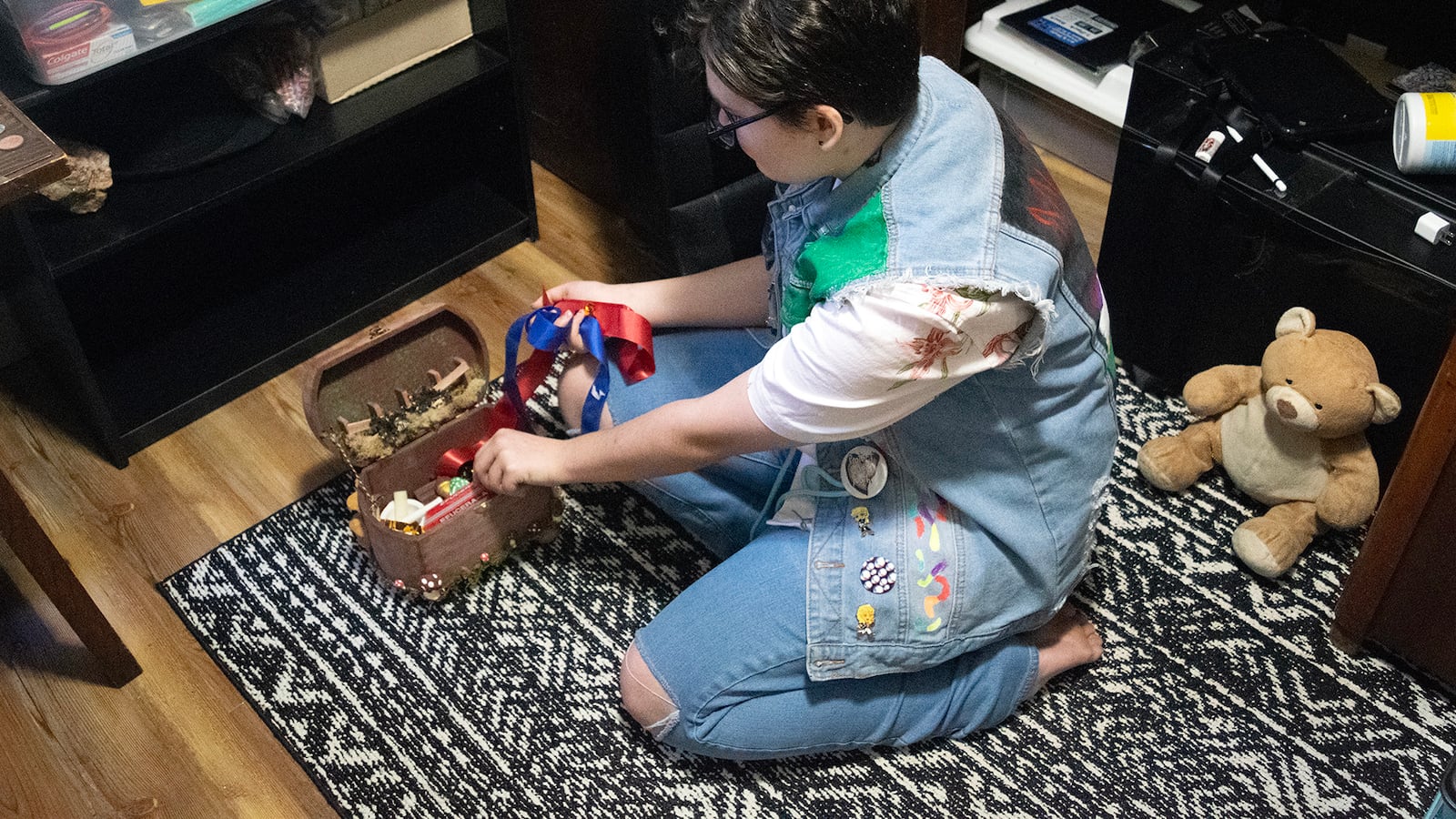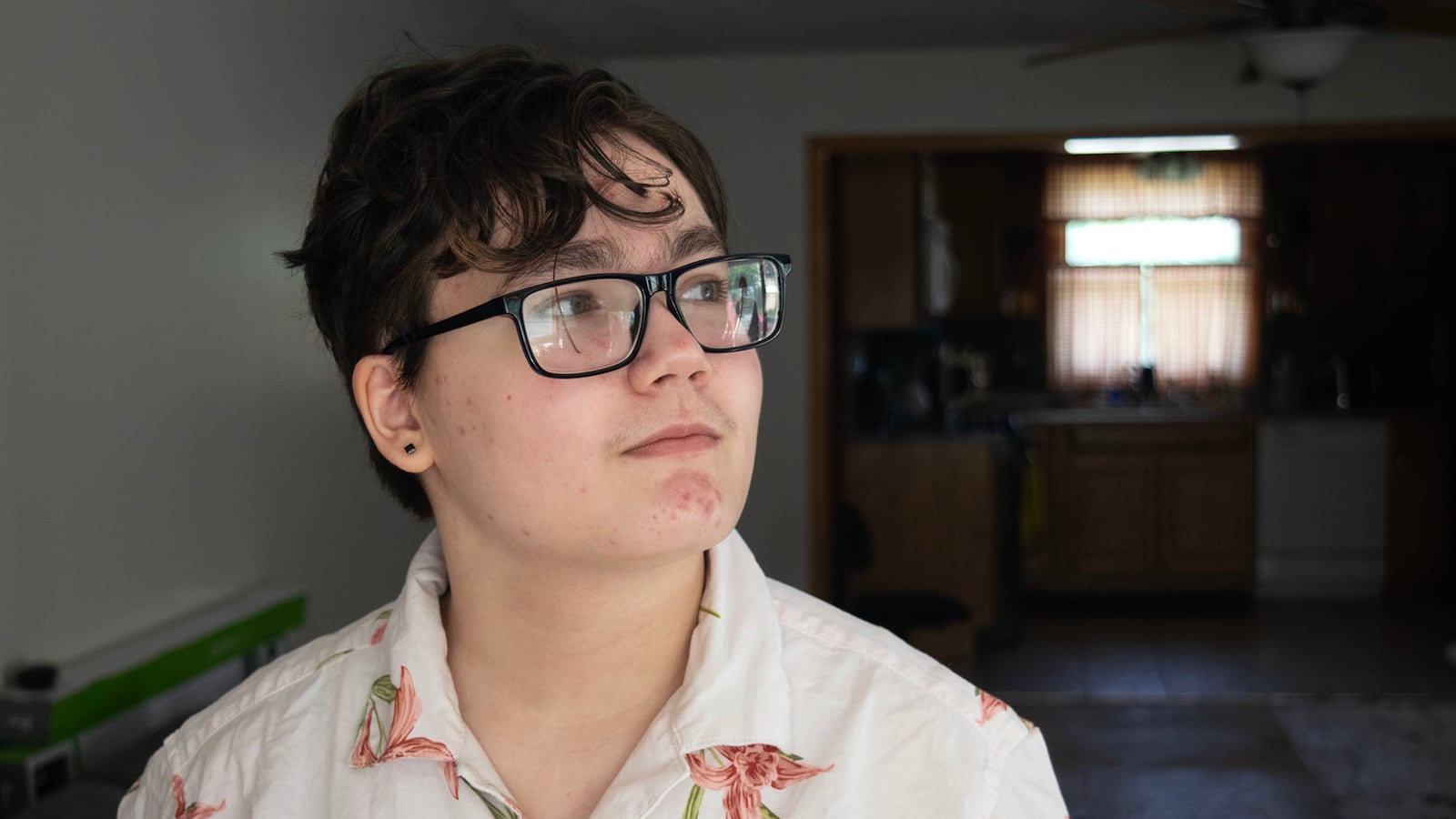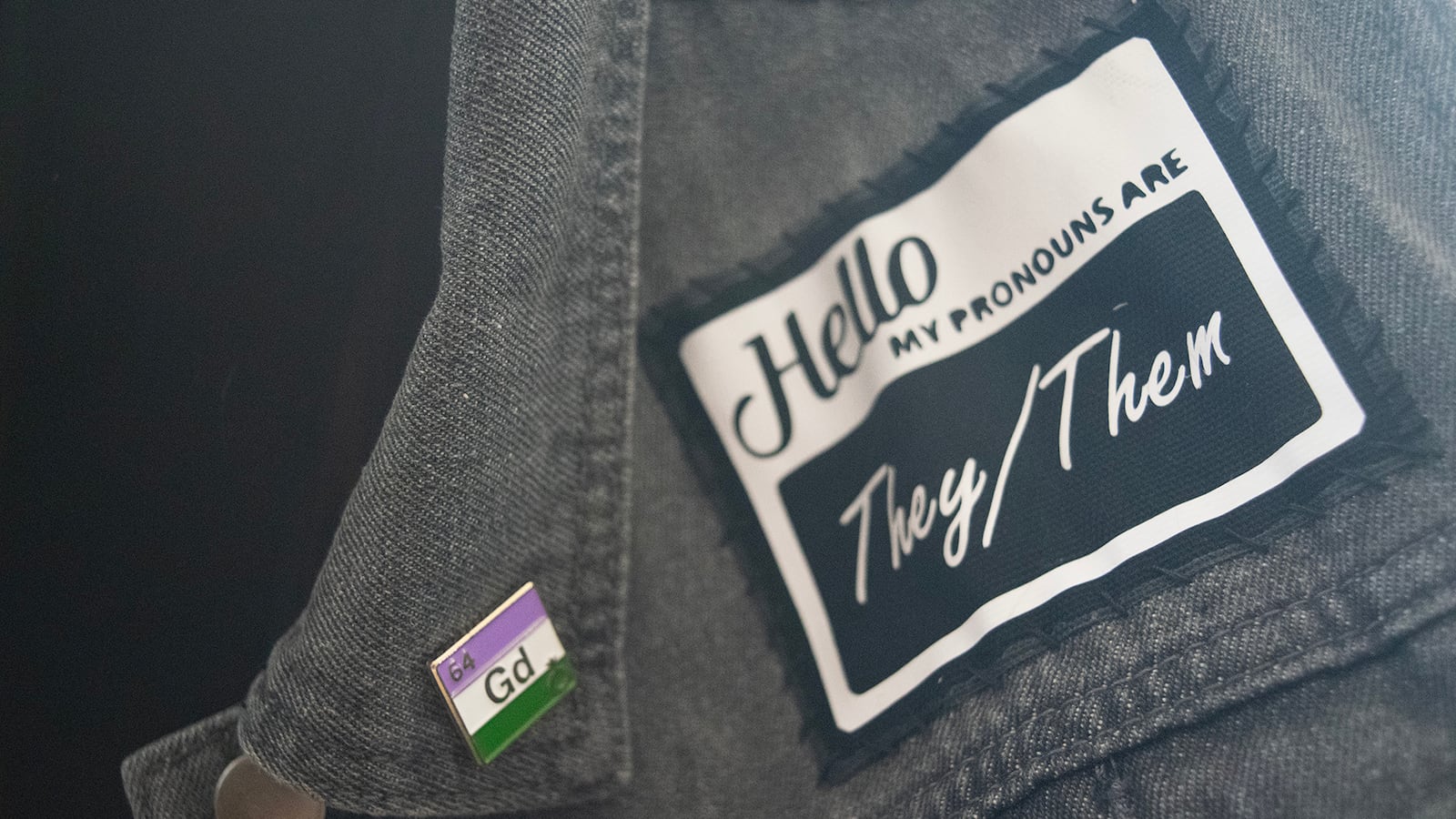Sign up for Chalkbeat Chicago’s free daily newsletter to keep up with the city’s public school system and statewide education policy.
Back in the spring, Kimberly Reynolds stared at a map of the U.S. Each state was filled in with a color gradient: red for those with the strictest active anti-transgender laws, bright blue for those with the most protections for trans people.
Her state, Florida, was awash in a sea of red. The closest state in blue? Illinois.
Reynolds took a breath. And some time to panic.
She had started researching a new place to live after legislators in Florida introduced a slew of anti-trans bills, many targeting transgender youth — including her 11-year-old son.
“Something inside me just broke,” she said. “I’ve dealt with a lot of policies in Florida that are not okay. But now they’re coming after my child. So that’s why we’re done. We’re getting out, one way or another.”
Reynolds asked her son: How do you feel about moving?
“I was like, ‘Yeah, let’s move. Let’s get out of this place. Let’s get out of this climate,’” Joseph Reynolds recalled thinking. “‘Let’s get out of this house. Get away from these people.’”
After Florida’s Republican Gov. Ron DeSantis signed several of the anti-trans bills into law in May, Reynolds again checked the map. This time, her state had a new, special designation, marked in black stripes:
Do Not Travel.
Three months later, the new school year has started, and the Reynolds family remains stuck in Florida. The laws are already deeply impacting her child, Reynolds said. She’s hoping to get her family to Illinois as soon as she can.
Florida is not the only state that has passed or is considering anti-trans legislation. This year, according to a Chalkbeat analysis of data from the American Civil Liberties Union, at least 14 states passed laws regulating bathroom access, sports participation, or pronoun and name changes specifically in K-12 schools. Additionally, at least 18 states passed laws restricting gender-affirming health care, primarily — though not exclusively — for minors.
For many families looking to protect their trans children in school and to preserve control over their medical decisions, moving seems like the only option — and Illinois a safe landing spot.
Bills impact school policies, sense of safety for trans students
Illinois is a sharp contrast to many states across the nation, where anti-trans policies are playing out in schools. Here, state law protects students from discrimination on the basis of their gender identities. Students must be permitted access to bathrooms, locker rooms, and sports teams aligning with their identities, according to state guidance.
Changes to education policy are a big part of why the Reynolds want to move.
Florida’s board of education prohibits public schools from teaching students about sexual orientation or gender identity. School staff are also not allowed to ask students for their pronouns — or be required to use them — under state law. Another law forces K-12 schools and postsecondary institutions to discipline students who use a restroom that doesn’t align with their assigned sex at birth.
Such laws threaten to disrupt the lives of thousands of young people in Florida — and across the country. About 1.4% of the U.S. population between 13 and 17 identify as trans, according to the Williams Institute’s 2022 estimates, which are based on analysis of Centers for Disease Control and Prevention youth surveys.
Even before the laws were passed, Joseph had run into discrimination at school. One time, he said, a kid in his class made a cross and screamed “die” while shoving it into his face. Still, he said his elementary school had largely been accepting, and he had a strong circle of friends.
But as Joseph watched the Florida laws come into effect over the summer, he said the idea of starting school there became more and more scary. Ahead of his first day of middle school this month, he had one word for how he was feeling: “horrible.”
At school, he introduced himself as Joseph to his classmates. He said they’ve mostly been respectful. But teachers have been calling him by his legal name, which he no longer uses, and using she/her pronouns to refer to him.
Under Florida law, teachers must use a child’s legal name unless a parent gives consent. After talking to multiple employees at her son’s school just to get a consent form, Kimberly Reynolds said, she’s not convinced that teachers will follow it.
Ultimately, she just wishes her son could have the chance to be a kid.
“He shouldn’t have to even know that there’s so many people against him and out to get him,” she said.
But Reynolds said it feels like there’s not much she can do right now. The timeline for their move is up in the air, since it’s been a struggle to get enough money to leave Florida. A few days after the laws were signed, she set up a GoFundMe to help with moving costs, but donations have slowed down. And Reynolds is concerned about having to leave most of her family behind in Florida, especially because she recently had a new baby.
Though her original plans have been delayed — and these challenges loom — she said she’s still prepared to move as soon as possible. They’ve even already started packing.
As for Joseph? “I just hope that it will be a lot more calm and peaceful than my life here.”
The Reynolds are hoping that the more accepting place could be Carbondale, a town in southern Illinois with a strong LGBTQ+ community, and where residents recently elected the first transgender person to a city council in Illinois.
In the center of town, a rainbow awning hangs above the doors of Carbondale’s LGBTQ+ community center, Rainbow Café. The executive director of the café, Carrie Vine, said that when anti-trans legislation began to increase across the country, a group of advocates got together and decided they should get the word out: Come to Carbondale.
They set up “Rainbow Refuge,” mainly run through a local group, the Carbondale Assembly for Radical Equity. People reach out over social media, and advocates direct them to accepting areas and schools, including Carbondale.
Vine has previously worked to help people in bordering states access abortion care. But she said supporting trans people through moving involves more long-term support.
“They’re not just coming here for one service and going home,” she said. “You’re talking about lifelong support — bloodwork, labs, doctor’s visits. So we decided we needed to make something that would be more sustainable.”
When families make that move, Vine said, it’s important to get them to a safe place for trans people. Though Illinois has statewide legal protections, she said, not everywhere is accepting.
Despite protections, not everywhere in Illinois feels safe
Jay Smith, a trans man living in a small town in rural Illinois, knows that struggle. For him, being openly trans isn’t a safe option.
Shortly after he finished his undergraduate degree, he got a job where his co-workers were openly discriminatory, using anti-LGBTQ+ slurs. To avoid harassment, he decided to keep his trans identity quiet and allow people to perceive him as a cisgender man. Smith is using a pseudonym for his safety in this story.
“I can’t really just exist a lot of the time,” Smith said. “At the same time, it’s nice to not have people policing me.”
Smith is only out to particular people that he’s close with, such as his girlfriend and friends from high school. He used to live in Chicago, where he was openly trans and connected with a LGBTQ+ community. Now, he said, he sometimes feels isolated.
Smith is becoming increasingly anxious about what might happen if he were to be outed — and he and his girlfriend are thinking about moving towns within Illinois or even leaving the country.
He’s not alone. Over half of trans and non-binary adults said they’d move — or already have moved — from a state with a gender-affirming medical care ban, according to a Human Rights Campaign survey.
As an adult, Smith can make that choice on his own. But he said he’s concerned about youth, who must rely on their parents to leave.
For him, he said, school acted as a place of escape against a lack of support he faced at home.
He attended Chicago Public Schools, where current district guidelines state that staff should use the names and pronouns that align with students’ identities. Students can request a support plan between administration and trusted adults — which doesn’t necessarily have to include parents.
That’s a divergence from bills that could “out” students as trans to their parents.
Smith graduated from CPS in 2017. When he came out as trans in high school, he said he simply emailed his teachers about his pronoun change. For the most part, he said, his school gave him a reprieve.
“It was nice to have that space from home, and know: My parents may not be able to treat me this way, but when I get here, I have that respect, that space, and that support that I just can’t get from home,” Smith said.
But Smith is scared for the kids who don’t have the same opportunity to escape transphobia, whether in school or out of school.
Families seek states that protect access to gender-affirming care
Packing up and leaving isn’t realistic for everyone. For many families, the options are limited to wherever is closest.
That’s the case for Carly West, who lives in St. Louis, Missouri. She is trying to move right across the border to Illinois, she said, in order to protect her trans child, Lisa.
“Sometimes I think that I’m overreacting, because it’s not like they’re banging down the door and pulling her out of my arms,” West said of the anti-trans push in Missouri. “But the reality is that she does need to be safe, and it’s not safe here.”
So much could change for Lisa with a short drive across state lines, West said.
In Illinois, Gov. J.B. Pritzker has spoken out in support of trans children and established a task force to create more inclusive school policy. In Missouri, the governor has signed bills to ban gender-affirming health care for minors and prohibit trans girls from playing on women’s sports teams.
When Lisa heard about the laws, she said she thought to herself: Why? I’m not hurting anybody.
Lisa came out at 6 years old. Now 11 and attending middle school, West uses she/her and they/them pronouns, alternating back and forth between the two. They wear rainbow glasses and like watching dessert decorating videos.
After moving, West said, the family plans to keep Lisa enrolled in the same school district, since Lisa spends half their time with their mom and the other half with their dad, who is staying in Missouri. But if school policies change, Carly West said Lisa may transfer.
The biggest threat right now is to Lisa’s gender-affirming medical care. For young people, such medical care might include puberty blockers — which can delay puberty-related changes such as facial hair growth — or hormone replacement therapy.

In Missouri, minors who were prescribed puberty blockers or hormones before Aug. 28 will be allowed to continue treatment, but health care providers cannot prescribe treatments to new patients.
Opponents of gender-affirming care say children are too young to make transition decisions and claim medical interventions are not safe. But more than a dozen top medical associations, including the American Medical Association and the American Academy of Pediatrics, support gender-affirming care as evidence-based and medically appropriate and have opposed laws restricting such care.
At least 33 states have proposed bills to limit gender-affirming care, according to a Chalkbeat data analysis of the ACLU’s 2023 anti-LGBTQ bills tracker. About a fifth of bills considered during the 2023 session would restrict gender-affirming medical care for adults, according to a Reuters analysis that identified additional bills not captured in the ACLU tracker. But most policies would specifically restrict children’s medical care.
In Illinois, state law protects health care providers and patients from being targeted by states that have banned gender-affirming care.
Before the cutoff date in Missouri, Lisa had a consultation to start gender-affirming care.
“I’m feeling great about it,” Lisa said, at the time. “It’s making me feel more like who I am.”
Then the ban went into effect Monday — and Lisa wasn’t able to be prescribed treatment.
Trans students carve out space in new Illinois towns, schools
On Feb. 28, the Nightengale family sat around the dining table in their Iowa home, making pins that read: “We say gay” and “Protect queer youth.” They stayed up late that night, preparing for a school walkout in protest of pending anti-trans laws in their state.
Shigeru Nightengale, 15, pinned the new additions to a vest, not too far from a demiboy pin. Shigeru mostly likes using it/its pronouns — sometimes he/him — because it feels void of gender but male-adjacent. Shigeru’s parent, Sami Nightengale, has a matching pin, for their own identity: genderqueer.

The next day, approximately 50 students walked out of Shigeru’s high school as part of a statewide protest against anti-trans legislation. Across the state, 27 schools participated in the March 1 walkout, the Quad-City Times reported.
But a bill banning gender-affirming medical care for minors passed the Iowa legislature and headed to the governor’s desk by March 8 — the day before Shigeru was due to receive its first testosterone shot.
Shigeru had been going to a clinic in Iowa City for over a year. Sami Nightengale first remembers Shigeru expressing thoughts about gender as a young child.
“When he was 7, he started to talk a lot about not feeling right in his own body and it would be better if he was just dead. As a parent, that’s not something you want to hear from a little kid,” they said. “Then we went through this whole process, seeing family doctors and therapists and psychologists and finally he figured out what was going on.”
All those appointments led up to the moment of Shigeru getting on hormones. But as the Nightengales made the trip to Iowa City, they had no idea whether the governor would sign the bill into law before Shigeru could get the shot.
“I was so scared that I was going to just touch it and then have it completely taken away,” Shigeru said.
That day, Shigeru got its first T shot, and doctors taught the Nightengales how to administer subsequent doses at home, a standard practice for hormone replacement therapy. What was not so standard: With the legislation on the governor’s desk, Shigeru didn’t know whether future hormone prescriptions would be possible.
The next day, the Nightengales started searching for new clinics in different states. But some places didn’t have availability, and others didn’t know whether they could take on Iowa patients.
Iowa’s governor officially signed the gender-affirming care ban into law on March 22, less than two weeks after Shigeru’s first shot.
“There was just too much going on — the terror of, ‘Oh, God. All of these people hate us, because we are a queer family,’ and also the joy of having my T,” Shigeru said. “It was all so much that I went kind of numb.”
When politicians first started discussing anti-trans legislation, the Nightengale family had loosely talked about moving. But they thought they’d have more time — to save money, to pay off debt, to search for the best home.
Over the course of March, the window to wait seemed to close more and more.
In early April, the family found an Illinois clinic that would take Shigeru. And against the odds, Sami Nightengale said, they were able to move before the start of the school year.
Now that Shigeru has settled in — and has reliable care — it said it can’t describe the joy it feels.
“It has been a struggle with ups and downs,” Shigeru said. “But I have been way happier than I have been pretty much my entire life.”
Having been on testosterone for a few months, Shigeru said this is its first time going into school “mostly sorted out.” Shigeru had previously come out as trans at school in Iowa, but felt people didn’t take it seriously because it still looked feminine.
So far, Shigeru said it has run into some discrimination at school, but that students and teachers have been fairly accepting. Looking ahead, Shigeru is staying hopeful — and carving out a space in Illinois.

On Shigeru’s bedroom desk are signposts of a new life: its first bottle of testosterone. A scattered rock collection. And, on top of one stone, a Band-Aid — narwhal-themed — from an appointment at the Illinois clinic.
Little things marking a big move.
Max Lubbers is a reporting intern for Chalkbeat Chicago. Contact Max at mlubbers@chalkbeat.org.
Kae Petrin is a data and graphics reporter for Chalkbeat. Contact Kae at kpetrin@chalkbeat.org.
Thomas Wilburn is the senior data editor for Chalkbeat. Contact Thomas at twilburn@chalkbeat.org.






